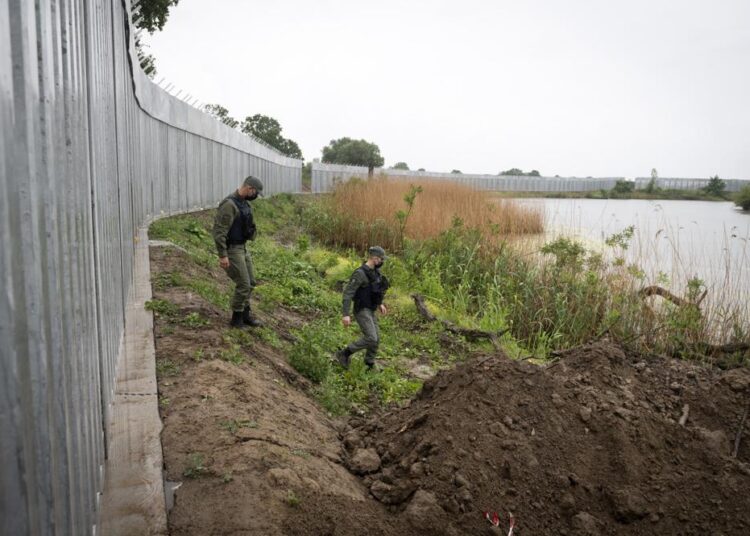HANGEDIGI, Turkey — From above, the new border wall separating Turkey from Iran looks like a white snake winding through the barren hills. So far it only covers a third of the 540-kilometer (335-mile) border, leaving plenty of gaps for migrants to slip across in the dead of night, AP reported.
Traffic on this key migration route from central Asia to Europe has remained relatively stable compared to previous years. But European countries, as well as Turkey, fear the sudden return of Taliban rule in Afghanistan could change that.
Haunted by a 2015 migration crisis fueled by the Syrian war, European leaders desperately want to avoid another large-scale influx of refugees and migrants from Afghanistan. Except for those who helped Western forces in the country’s two-decade war, the message to Afghans considering fleeing to Europe is: If you must leave, go to neighboring countries, but don’t come here.
Austria, among the EU’s migration hard-liners, suggested setting up “deportation centers” in countries neighboring Afghanistan so that EU countries can deport Afghans who have been denied asylum even if they cannot be sent back to their homeland.
The desperate scenes of people clinging to aircraft taking off from Kabul’s airport have only deepened Europe’s anxiety over a potential refugee crisis. The U.S. and its NATO allies are scrambling to evacuate thousands of Afghans who fear they’ll be punished by the Taliban for having worked with Western forces. But other Afghans are unlikely to get the same welcome.
Even Germany, which since 2015 has admitted more Syrians than any other Western nation, is sending a different signal today.
Several German politicians, including Armin Laschet, the center-right Union bloc’s candidate to succeed Angela Merkel as chancellor, warned last week that there must be “no repeat” of the migration crisis of 2015.
On Monday, French President Emmanuel Macron stressed that, “Europe alone cannot shoulder the consequences” of the situation in Afghanistan and “must anticipate and protect ourselves against significant irregular migratory flows.”
Such talk makes Turkish President Recep Tayyip Erdogan see red. His country already hosts 3.6 million Syrians and hundreds of thousands of Afghans, and he has used the threat of sending them to Europe for political leverage.
“Turkey has no duty, responsibility or obligation to be Europe’s refugee warehouse,” Erdogan warned in a speech Thursday.
The Turkish president talked about migration from Afghanistan in a rare phone call with Greek Prime Minister Kyriakos Mitsotakis on Friday, and also is discussing the issue with Iran, a statement from Erdogan’s office said.
Attitudes toward migrants have hardened in Europe following the 2015 crisis, fueling the rise of far-right parties like the Alternative for Germany, the biggest opposition party in parliament ahead of the federal election next month.
Even in Turkey, migrants from Syria and Afghanistan, once treated like Muslim brethren, are increasingly viewed with suspicion as the country grapples with economic problems including rising inflation and unemployment.
Acknowledging the public’s “unease” about migration, Erdogan noted how his government has reinforced the eastern border with Iran with military, gendarmerie, police and the new wall, which has been under construction since 2017.
UNCHR estimates that 90% of the 2.6 million Afghan refugees outside of the country live in neighboring Iran and Pakistan. Both countries also host large numbers of Afghans who left in search of better economic opportunities.
By comparison, about 630,000 Afghans have applied for asylum in EU countries in the past 10 years, with the highest numbers in Germany, Hungary, Greece and Sweden, according to the EU statistics agency. Last year, 44,000 Afghans applied for asylum in the 27-country bloc.
Jan Egeland, secretary-general of the Norwegian Refugee Council, said it’s not a forgone conclusion that the Taliban takeover will result in a new refugee crisis.
“I would warn against a self-fulfilling prophecy,” he told AP. Afghans are “scared, bewildered but also hopeful that a long, long war will be over and maybe now they can avoid the crossfire.”
He said much depends on the Taliban allowing development and humanitarian work in the country and on donor nations continuing to fund those efforts.
“If you would have a collapse of public services and if there would be a major food crisis, there will be for sure a mass movement of people,” Egeland said.






Discussion about this post